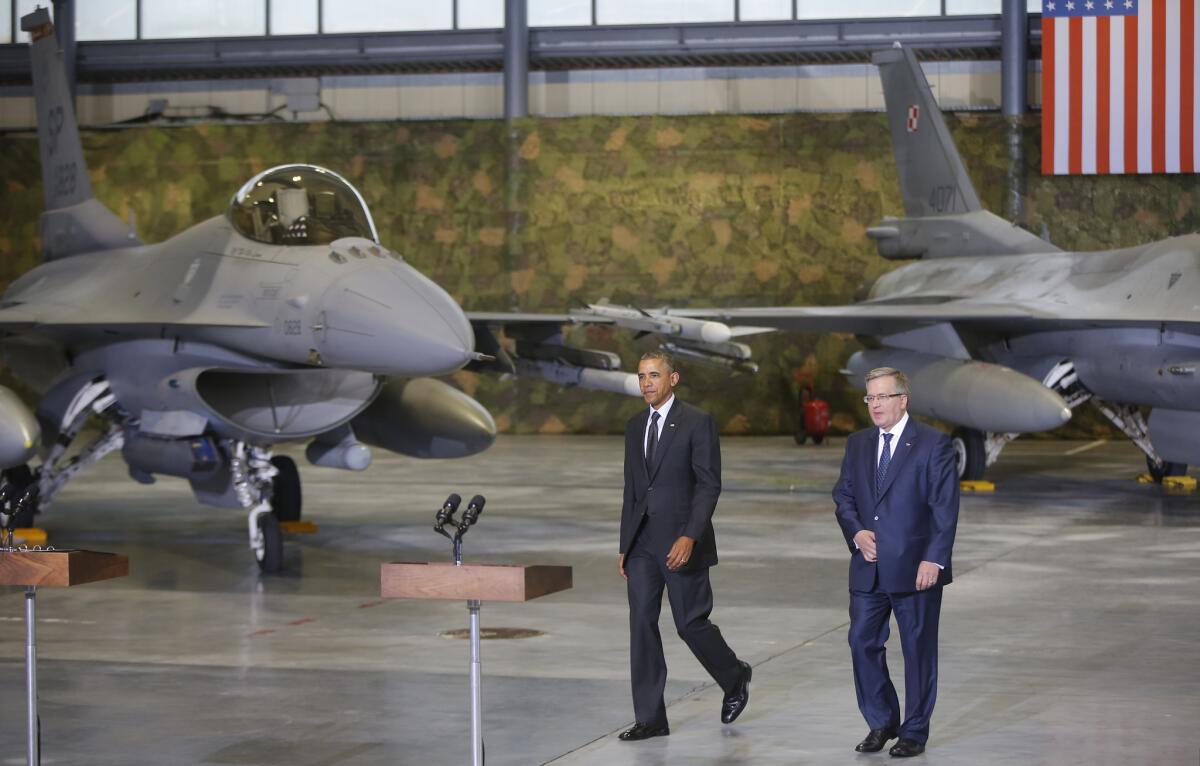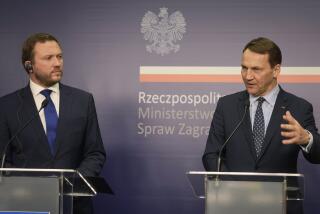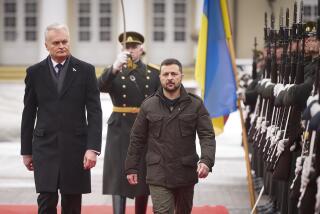Putin’s actions in Ukraine sow fear across former Soviet empire

President Obama’s pledge to defend allies in the former communist states of Eastern Europe and to seek $1 billion from Congress to bolster regional defenses might be Russian President Vladimir Putin’s nightmare come to life.
Or, it might be just the revival of East-versus-West rivalry that Putin finds useful. The Russian president seeks to persuade his countrymen that Russia has recovered its Soviet-era status as a great power.
Either way, it is the countries spun off by the 1991 breakup of the Soviet Union that are pawns in the Kremlin leader’s campaign to reassert Russian authority, fend off neighboring countries’ drift into the West’s military and economic orbit and to restore pride among Russians who have endured shrinking clout in the world since the Cold War ended.
Putin has consistently railed against the encroachment of NATO, which has inducted the three Baltic states -- Estonia, Latvia and Lithuania -- that were captive republics of the Soviet Union, as well as the entire Eastern European membership of the defunct Warsaw Pact military bloc. As part of Obama’s European trip, the president met Tuesday night with leaders from the Baltic states and former Moscow allies Poland, the Czech Republic, Slovakia, Hungary, Romania, Bulgaria and Croatia.
It was a message to the Kremlin that the Western alliance remains committed to its founding principle that an attack on any of its members is considered an attack on all.
Putin justified his invasion and annexation of Ukraine’s Crimea peninsula this year as necessary to protect Russians from repression by opposition politicians who took power in Kiev after Kremlin-allied Ukrainian President Viktor Yanukovich fled to Russia in February.
Like Ukraine, the former Soviet republics of Latvia, Estonia and Kazakhstan have large Russian minorities whose linguistic and cultural rights have been weakened since the countries became independent, sowing fear among Russia’s neighbors that they, too, might be vulnerable to Putin’s expansionist objectives.
Whether the Baltic states have reason to be apprehensive of a newly aggressive Kremlin is open to debate, as they are now full-fledged members of NATO and entitled to the alliance’s protection. Ukraine, which under Yanukovich’s leadership heeded the Kremlin’s red line against it joining the former rival alliance, doesn’t enjoy the same guarantees of collective defense as a mere participant in NATO’s so-called Partnership for Peace.
“In Russian eyes, the difference between a NATO member and a NATO partner country may not be all that salient, but they understand that in American eyes it does make a difference,” Matthew Rojansky, head of the Wilson Center’s Kennan Institute, said of Putin’s awareness of the risk of conflict with the West if he were to attack one of the Baltic states.
Although Estonia and Latvia have bigger proportions than Ukraine of ethnic Russians -- 24.8% and 26.25%, respectively, compared to about 17.3% in Ukraine -- they are “living the dream” in the more affluent and democratic company of European Union states, said Rojansky. Unlike Russians living in eastern Ukraine’s depressed industrial belt, the Baltic Russians wouldn’t be easily lured into giving up their better living standards and freedoms to bring back Russian rule, he said.
Kazakhstan, home to more than 4 million Russians, or 23.7% of the population, has maintained close political and economic ties with Moscow throughout the 25-year tenure of President Nursultan Nazarbayev. Kazakhstan has joined Putin’s Eurasian Union, a political and economic bloc intended to rival the European Union.
But even loyal Kazakhstan issued a rare rebuke of the Kremlin in March when Russian troops seized Crimea.
Another ex-Soviet republic experiencing a fresh bout of nervousness in the region is Moldova, which put its border forces on alert last month as Russian-Ukrainian fighting spread to Odessa, a Black Sea port about 30 miles from the Moldovan border.
Putin’s Crimea seizure has cost his economy billions in capital flight and provoked a robust response from NATO, which has deployed air and ground troops to member states bordering Russia. The package of security aid to Eastern Europe that Obama announced when he arrived in Warsaw on Tuesday includes plans for expanded military exercises in the region and stepped-up training and assistance to non-NATO members Ukraine, Georgia and Moldova.
“It’s costing them money and making them less secure,” Rojansky said of Russia’s actions in Ukraine. “They don’t like NATO deployments in the region, and they just got a ton of new NATO deployments.”
Other scholars of post-Soviet politics aren’t so sure Putin’s calculus is based on economic self-interest.
“It seems Mr. Putin has decided to test the stability of the international system in a surprisingly resolute manner,” said Igor Lukes, professor of international relations and history at Boston University. “I think his anschluss of Crimea, which appears to be a fait accompli that no one seems to think about reversing, was a serious defeat for international stability and the notion that borders cannot be changed by force.”
In the 23 years since the collapse of the Soviet Union, Russians have endured lawlessness and hardship, Lukes said. But what has galled them the most is the loss of their superpower status.
“There was not enough food in stores and the medical care was lousy and Russian men were dying at an earlier age than men in Togo, but all of that was bearable because we had Sputnik, we had the first man in space, the country had leaders who when they spoke, the world listened. That disappeared with the Soviet Union,” Lukes said.
“One of the reasons that Russians like Putin, and he is hardly a likeable person, is that he has given them back a sense of belonging to a significant power. When he speaks, Washington listens,” Lukes said.
He points to Putin’s 80-plus-percent approval ratings since annexing Crimea as a prime cause of the fear in other former Soviet territory.
“Having achieved this great success in Crimea, he may try to replicate what he has done in eastern Ukraine elsewhere,” said Lukes. “The difficulty of being on such a path is knowing where to stop. That is why Estonians and Latvians and Lithuanians and Poles are justifiably concerned.”
More to Read
Start your day right
Sign up for Essential California for news, features and recommendations from the L.A. Times and beyond in your inbox six days a week.
You may occasionally receive promotional content from the Los Angeles Times.







